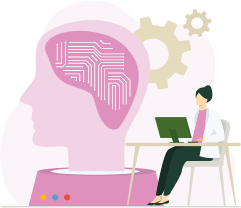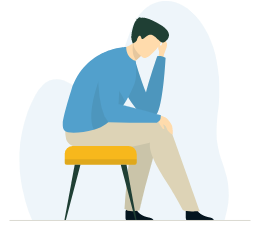What is Mindgram based on?
Psychology and psychotherapy are the foundations of our platform. These are the fields that Mindgram and all the individual programs we create are built on. Below you will find the psychological and psychotherapeutic methods that help us find solutions for our platform users.

Positive psychology, seeking subjective well-being
Positive psychology, often referred to as the science of happiness, centers on the basis of well-being. Thanks to the methods based on positive psychology, our platform users learn how to develop necessary skills needed to improve personal well-being, such as finding positive emotions and experiences, commitment, good relations, sense, achievements and health (according to the professor Seligman’s PERMAH model).

Mindfulness
Mindfulness is a set of techniques that help people be fully present, focus, be aware of where they are and what they’re doing, and not being overwhelmed by what’s going on around them.
Mindfulness helps you live in the moment. The main purpose is not to think about the past nor to worry about the future. Mindfulness can be achieved through relaxation techniques, meditation and has the following effects: lower stress levels, improved sleep quality and better concentration.

Solution-focused brief therapy
This approach does not analyze problems, but focuses on finding solutions. The main objective is to focus on the future and to set achievable goals. Thanks to newfound hope and positive reinforcement, individuals pursue goals more willingly without unnecessarily worrying about past and current problems.

Systemic therapy
Systemic therapy studies the social interactions and human environments (systems), which have a significant impact on mental well-being. The basic system is the family or people close to us (our partners, people we live with). The knowledge coming from systemic therapy is an increasingly popular tool used by companies to address the well-being of employees and to create ideal conditions for the development of their potential. It is usually aimed at solving current problems in an environment important to the individual. The goal of this type of psychotherapy is to modify the current systems in which employees function.

Integrative psychotherapy
A flexible model of psychotherapy tailored to individuals’ needs by an experienced psychotherapist. The therapy can be short-term or long-term. This type of psychotherapy is very effective and satisfactory due to the method variety and flexibility.

Cognitive-behavioral therapy
This therapy centers on the belief that thoughts, emotions, and human behavior influence each other, and create patterns to identify which ones are incorrect and cause suffering. People consolidate their behavior and perception of the world through acquired experience. Therapy is needed when these fixed behaviors are inappropriate, affect an individual’s functioning causing a feeling of discomfort, loss, sadness, fear or other form of suffering. The sessions detect distorted interpretations of reality and, through therapy, replace them with the correct ones. The therapy can be short-term or long-term.

Humanistic psychotherapy
Humanistic psychotherapy discovers the unmet psychological needs of a person that lead to shortages in personality development. This therapy helps to find the way to self-acceptance and self-understanding, and discovers individuals inner resources, needs, and desires. The main working tool is the conversation. Properly built therapeutic bond plays an important role here. The therapist acts as a guide, creating an atmosphere full of empathy and acceptance. In addition, the therapist does not judge nor puts pressure on making decisions. The therapy focuses on the present and the future, and it can be short or long-term.

Lifestyle medicine
Lifestyle medicine is a relatively new branch of medicine. It helps you to change everyday behavior and habits to prevent or cure diseases of affluence.
The preventive and curative lifestyle medicine programs are selected individually. They cover 6 essential areas in order to maintain good health:
- Giving up or limiting smoking (and other stimulants).
- Proper nutrition.
- Physical activity.
- Coping with stress.
- Healthy sleep.
- Social support.

Neuroscience
Neuroscience studies the functioning of the central nervous system. It combines, among others, biology, neurology, psychiatry, and psychology.
Neuroscience covers topics such as:
- understanding the structure and functioning of the brain in health and disease,
- the biological foundations of normal and disturbed behavior, emotions or cognition,
- the inheritance of neurodegenerative diseases,
- the examination of the anatomical and biological elements of mental illnesses,
- the brain as a source of cognitive and executive functions,
- the relationship between a physical stimulus and a subjective feeling,
- the perception and reaction,
- the memory.

Substance abuse therapy
During therapy, the patient learns about addiction, its symptoms, course, consequences and impact on life. In substance abuse therapy, patients work on strengthening their motivation and taking responsibility for their health.
This kind of therapy can be implemented in individual or group therapy. A very important element is participation in support groups. After completing the basic addiction treatment program, it is advisable to participate in in-depth therapy.